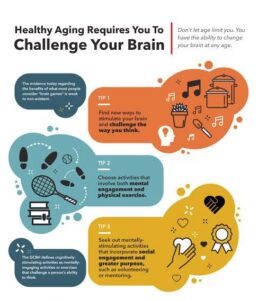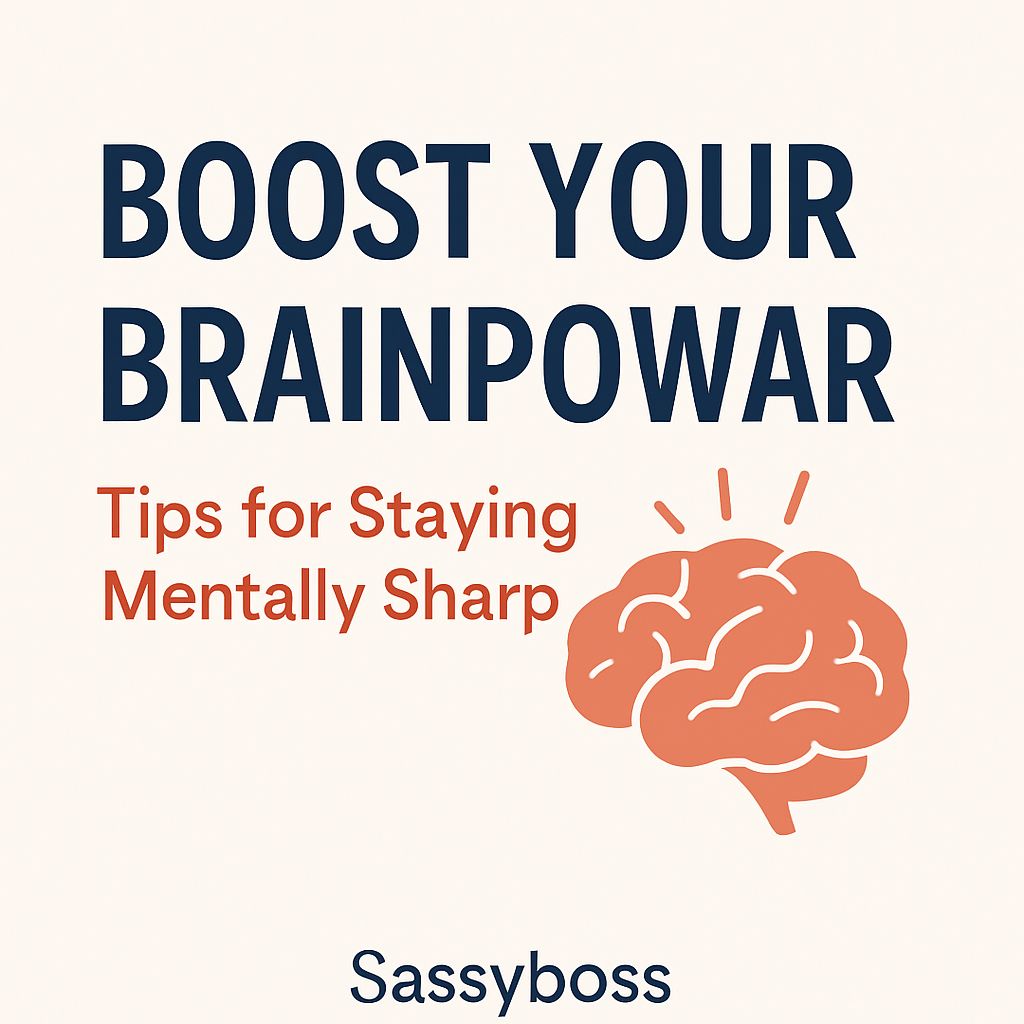Boost Your Brainpower: Tips for Staying Mentally Sharp
In today’s fast-paced world, mental clarity and focus are more important than ever. Whether you’re a student, a working professional, or someone enjoying retirement, maintaining cognitive function can greatly enhance your quality of life. Fortunately, staying mentally sharp isn’t just about genetics—it’s about lifestyle choices, daily habits, and consistent mental stimulation.
In this blog post, we’ll explore practical and science-backed tips for staying mentally sharp at any age. From brain-boosting foods to mindful routines, these strategies will help you enhance memory, improve focus, and keep your mind sharp and agile.

1. Prioritize Quality Sleep
Sleep is foundational to mental health and cognitive performance. During deep sleep, your brain processes memories, removes toxins, and restores energy levels. Without adequate rest, your concentration, creativity, and problem-solving abilities suffer.
Tips for better sleep:
• Aim for 7–9 hours of sleep each night.
• Establish a consistent sleep schedule.
• Avoid screens and caffeine before bedtime.
• Create a calming bedtime routine to signal your body it’s time to rest.
2. Stay Physically Active
Exercise isn’t just good for your body—it’s essential for your brain. Regular physical activity increases blood flow to the brain, reduces stress hormones, and promotes the growth of new brain cells, especially in the hippocampus, the region associated with memory.
Best exercises for brain health:
• Aerobic exercises like walking, swimming, or cycling.
• Yoga and tai chi for combining physical movement with mental focus.
• Strength training to boost mood and improve overall brain function.
3. Challenge Your Brain Daily
Just like muscles, your brain gets stronger the more you use it. Engaging in mentally stimulating activities helps build cognitive reserves that may delay the onset of memory-related disorders.
Brain-boosting activities:
• Learn a new language or instrument.
• Solve puzzles, crosswords, or Sudoku.
• Play strategy games like chess or Scrabble.
• Try memory or brain-training apps.
These activities keep your brain engaged and improve problem-solving, memory, and concentration.

4. Eat a Brain-Healthy Diet
Your brain needs the right nutrients to function at its best. A diet rich in antioxidants, healthy fats, vitamins, and minerals supports cognitive health and helps reduce the risk of neurodegenerative diseases.
Foods that boost brainpower:
• Fatty fish (like salmon and mackerel) are high in omega-3 fatty acids.
• Leafy greens like spinach and kale are packed with antioxidants.
• Berries are rich in flavonoids that improve communication between brain cells.
• Nuts and seeds, especially walnuts, are great sources of vitamin E.
• Whole grains help stabilize blood sugar levels and improve focus.
Avoid excessive sugar, refined carbs, and processed foods that can impair memory and lead to brain fog.

5. Stay Socially Connected
Social interaction plays a vital role in emotional and cognitive health. Regular connection with others stimulates your mind, reduces stress, and may lower the risk of cognitive decline.
Ways to stay socially active:
• Schedule regular meetups with friends and family.
• Join clubs, classes, or volunteer organizations.
• Engage in meaningful conversations.
• Try group hobbies like book clubs, dancing, or cooking classes.
Meaningful social connections keep your mind engaged and your spirits lifted.
6. Practice Mindfulness and Stress Management
Chronic stress can damage brain cells and impair memory. Practicing mindfulness helps you stay present, improves emotional regulation, and reduces anxiety—all of which are beneficial for your brain.
Mindfulness strategies:
• Practice deep breathing or meditation for 10–15 minutes daily.
• Journaling your thoughts can improve clarity and emotional processing.
• Try yoga or guided imagery for relaxation.
• Take regular breaks during work to reset your mind.
By learning to manage stress effectively, you can enhance focus, memory, and emotional well-being.
7. Keep Learning and Stay Curious
Lifelong learning is a powerful way to stay mentally sharp. Whether you’re reading a new book, taking a course, or exploring a new hobby, continuous learning keeps your brain adaptable and resilient.
Learning opportunities to explore:
• Enroll in online courses (many are free or low-cost).
• Listen to educational podcasts or audiobooks.
• Watch documentaries on topics that interest you.
• Experiment with creative hobbies like painting or writing.
The key is to stay intellectually engaged and open to new experiences.
8. Limit Multitasking and Embrace Focus
While multitasking might seem efficient, it actually reduces productivity and makes your brain work harder. Focusing on one task at a time helps you retain information better and improves the quality of your work.
Tips to improve focus:
• Use techniques like the Pomodoro method (25 minutes of focused work followed by a 5-minute break).
• Remove distractions by turning off notifications.
• Set clear daily goals and prioritize tasks.
• Practice single-tasking—doing one thing with full attention.
Over time, your ability to concentrate will improve, boosting your mental sharpness.
9. Stay Hydrated
Even mild dehydration can impair concentration and cognitive performance. Your brain is about 75% water, so staying hydrated is crucial for optimal function.
Hydration tips:
• Drink at least 6–8 glasses of water daily.
• Start your day with a glass of water.
• Limit sugary and caffeinated drinks that can dehydrate you.
• Eat water-rich foods like cucumbers, watermelon, and oranges.
Proper hydration improves energy, alertness, and memory function.

10. Get Regular Health Check-Ups
Certain medical conditions—like thyroid issues, vitamin deficiencies, or high blood pressure—can affect brain health. Routine check-ups help you catch and manage these issues early.
Important check-ups for brain health:
• Monitor blood pressure and cholesterol.
• Check for vitamin B12 and D deficiencies.
• Manage diabetes or other chronic illnesses.
• Discuss any memory concerns with a healthcare provider.
Taking care of your physical health directly supports your mental sharpness.

Final Thoughts
Staying mentally sharp is not a one-time effort—it’s a lifelong commitment. By incorporating these practical tips into your daily routine, you’ll be better equipped to stay focused, think clearly, and live with vitality. Whether it’s through a healthier diet, regular exercise, or mindful living, every small change adds up to a sharper, more resilient brain.
Remember: Mental sharpness is like a garden. It flourishes with consistent care, attention, and nurturing. Have any personal tips for staying mentally sharp? Share them in the comments below! And don’t forget to subscribe to our blog for more wellness and lifestyle content.
